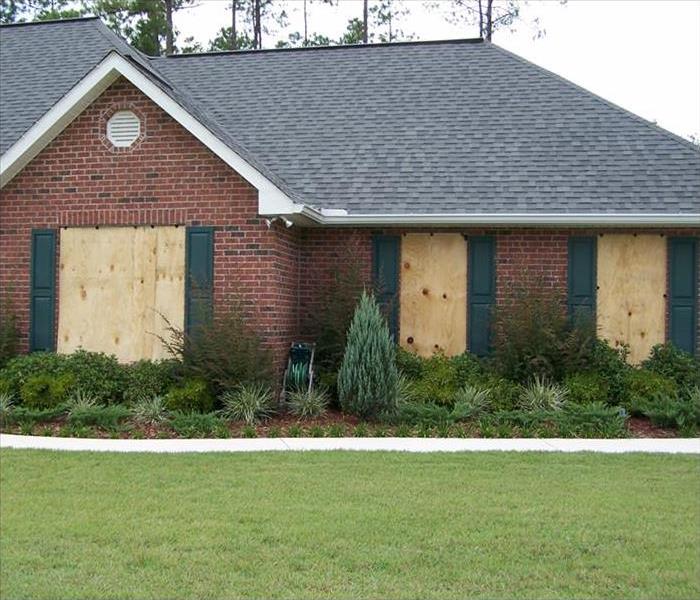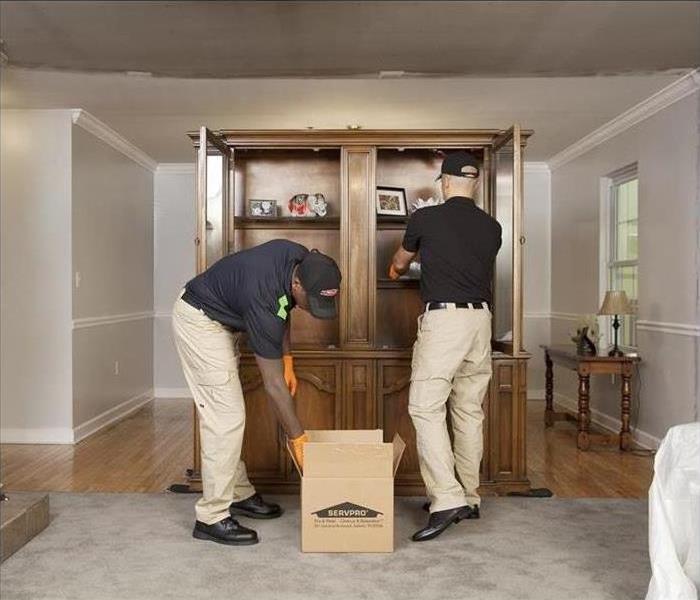Archived Building Services Blog Posts
Emergency Board-Up
6/30/2021 (Permalink)
When you think of natural disaster mitigation, you might think of picking up tree limbs or dealing with excess water. Boarding up a structure is probably the last thing on your mind. If a tree damages the roof or breaks windows, or a car hits the side of the house, you’ll need board-up services right away to prevent further damage.
There are many reasons to board up a home or business after a disaster, but these three are the most important:
-Shelter from the elements. During a disaster, your home or business can take quite a beating from high winds, heavy rains and debris. Broken windows, damaged roofs and walls can let in rain, snow and wind to cause more damage to your interior and its contents. Water buildup can ruin flooring and carpet as well as damage electronics. Mold begins growing within just a few days, causing even more damage.
-Shelter from animals. A wild animal does not need much room to squeeze inside, so even a small broken window can let in unwanted guests. Dogs, raccoons, rats and other pests can wreak havoc inside a building. Not only will they track dirt everywhere, but they’ll tear up furnishings, urinate and defecate anywhere they can.
-Protection from vandals. One sad fact of human nature is that even after the worst storms, there are those who will take advantage and help themselves. At best, they’ll do more damage by breaking things and spray-painting walls. At worst, they will steal anything they can lay their hands on – electronics, money, and artwork to name a few. The building will be unoccupied at the time, and security equipment may be damaged, or the power can be out, so they may get away free and clear.
No matter the size - residential or commercial, you can count on SERVPRO to secure and protect the setting.
Remodeling myths
6/22/2021 (Permalink)
Reality television has a good way of making home remodeling look fast, easy, and affordable. However, it can be much grittier than portrayed. Most people do not understand the ins and outs of renovation and are sometimes skeptical to hire a professional, for the fear of being ripped off. Here are some myths that people often believe.
Doing the renovation yourself will save you money – Home renovation is not always as simple as replacing carpet or torn wallpaper. Using a trusted professional can actually save you time and money. Not only can it prevent mistakes, they can provide you with a detailed written estimate, timeline, and calendar of events.
Renovations cause havoc to the entire house and yard – Professional renovators understand how to work in a limited space. Depending on the scope of work, most families remain in their home during the remodeling process. A good contractor will clean up after each day and maintain a habitable living space for you and your family.
A permit is not needed to remodel – You may need a permit and/or HOA approval before any construction begins. Projects that will not often need a permit would be paining, decorating, new flooring, installing carpet and simple additions throughout; however, projects such as demolishing a part of the building, new / altered plumbing and heating systems, changing window and door size , may often require a permit.
Moving out – Tips for an easy move
5/20/2020 (Permalink)
Buying and selling a home can be a hectic process. Many people often say it’s one of the most stressful life experiences. Not only do you have to do the hard labor work of physically moving all your belongings, but your life doesn’t stop when the time comes. Between getting things in order, changing school systems, potentially going through a simultaneous career adjustment – it can present an abundant amount of work and stress.
Purge before you pack – Before you begin packing, do a walk through and rid anything that you do not need. You can make separate piles for any unwanted items – donate, trash and sale. If you do it early enough, you can even have a yard sale.
Start packing things you don’t use – In order to prevent waiting until the last minute to begin packing, you can start a few weeks ahead of time and pack items that you rarely use. This allows you to get packing done early, but not miss out on any of your necessities.
Bundle your hangers – Re hanging clothes can be a pain and very tedious. Try and keep most, if not all, of your clothes on hangers and group them up. Every group of 10 or so, can rubber banded together, and you can use a trash bag as a garment bag to hold them.
Pack tight – Pack the boxes as tight as you can and prevent leaving any open space. Bundle breakable items and any empty space in the box, stuff with packing paper or towels.
Label boxes and rooms – To make unpacking easier, label the box with what’s inside the box, and what room of the house it belongs to. It will make it much smoother when it comes time to unpack and organize everything into your new home.
Take photos – If you want to mimic how you have things set up, or how cords are connected, take pictures. It will give you a good reference when it comes time to decorate or plug your sound system into the television.




 24/7 Emergency Service
24/7 Emergency Service


